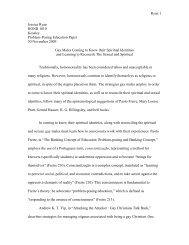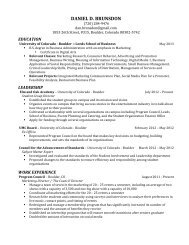Scott Posilkin Capstone Paper The Psychology of Video Game ...
Scott Posilkin Capstone Paper The Psychology of Video Game ...
Scott Posilkin Capstone Paper The Psychology of Video Game ...
Create successful ePaper yourself
Turn your PDF publications into a flip-book with our unique Google optimized e-Paper software.
<strong>The</strong> <strong>Psychology</strong> <strong>of</strong> <strong>Video</strong> <strong>Game</strong> addiction<br />
<strong>Scott</strong> <strong>Posilkin</strong><br />
<strong>Capstone</strong> <strong>Paper</strong><br />
People <strong>of</strong>ten are a bit taken aback when I tell them that I am majoring in <strong>Psychology</strong> and<br />
minoring in Technology, Arts & Media. <strong>The</strong>y <strong>of</strong>ten claim that it is an odd combination, and<br />
always tell me that the two do not go well together. People are <strong>of</strong>ten more shocked when I tell<br />
them that I work in the technology industry, and use my Psych degree every day (granted not as<br />
much as I use my TAM minor). Knowing how to use Photoshop, Dreamweaver, Illustrator and<br />
the like are all valuable skills, but knowing how to use them to relate to people’s way <strong>of</strong> thinking<br />
makes them even more valuable. In fact, one <strong>of</strong> the biggest uses <strong>of</strong> <strong>Psychology</strong> is in the<br />
entertainment industry. <strong>The</strong>y are now measuring peoples brain activity while doing things<br />
activities such as watching TV ads, or playing video games in order to see where they can<br />
improve their products, and which parts people are, and are not, enjoying. Unfortunately,<br />
<strong>Psychology</strong> is <strong>of</strong>ten used to point out and explain problems with society, and such is the case<br />
with video games.<br />
<strong>Video</strong> game addiction has become a large problem within the United States, and many<br />
other developed countries such as the UK, and China. It is hard to explain the scope <strong>of</strong> the issue,<br />
and even harder to define it. At what point does a hobby such as playing video games become an<br />
addiction? Where do we draw that line? Can something such as a video game even be classified<br />
as addicting, since it does not even technically exist, and has no chemical component
whatsoever? And if video games can be classified as addicting, can it be labeled a drug? Modern<br />
<strong>Psychology</strong> is being used to attempt the answers to these, and many other related questions.<br />
<strong>Video</strong> games have been around in society in one form or another for over thirty years. It<br />
was not until the past decade that they really became more mainstream and reached a level <strong>of</strong><br />
realism capable <strong>of</strong> pulling people in for large and potentially unhealthy amounts <strong>of</strong> time. Two<br />
games were especially important in establishing and raising awareness <strong>of</strong> the idea <strong>of</strong> video game<br />
addiction. Everquest, and Counter-Strike, released in 1999 and 2000 respectively, drew players<br />
in on a whole new level (Decker 2012).<br />
Let’s start with Everquest, which was released in 1999 was has been labeled the “mother<br />
<strong>of</strong> all MMO games”. MMO stands for Massively Multiplayer Online, and it is arguably the most<br />
addictive genre <strong>of</strong> gaming that currently exists. MMOs are a very complicated type <strong>of</strong> video<br />
game for several reasons. First, <strong>of</strong> all, they never end. You can keep playing an MMO to gain<br />
new powers, gear, and levels pretty much forever. People still play the original Everquest,<br />
despite the fact that it came out 13 years ago. Another reason that MMOs are so addictive is that<br />
they are extremely social games. MMO servers consist <strong>of</strong> thousands <strong>of</strong> players playing together<br />
in the same virtual space, so people make friends, and <strong>of</strong>ten join groups <strong>of</strong> players called<br />
“guilds” with whom they play, fight other players, and socialize with. For many people who have<br />
issues making friends in real life, having a ton <strong>of</strong> digital friends is just as addicting if not more<br />
addicting than the game itself (Dauriat 2012),. <strong>The</strong> game itself however keeps expanding, making it<br />
addicting by itself. MMOs are unique in that most <strong>of</strong> them require players to keep paying a<br />
monthly access fee. This fee is used to develop more content, so that players never get bored or<br />
run <strong>of</strong> out things to do. Combine a game that is fun, never ends, has a huge social aspect to it,<br />
and is always changing and you have a recipe for addiction.
For many players, the fun and stimulation they gain from MMOs like Everquest are<br />
simply more than they gain from real life, and thus they naturally transition into a state in which<br />
they spend more time in the virtual world than they do the real one (Decker 2012). Take for<br />
instance the example <strong>of</strong> Shawn Woolley. Before Shawn started playing Everquest he was a<br />
normal boy who never had any trouble with addiction <strong>of</strong> any kind. Shortly after playing<br />
Everquest his personality changed, and he lost almost all contact with his family. He was soon<br />
seeing a Psychiatrist, a therapist, and a doctor regularly. It wasn’t long before Shawn had quit his<br />
job to play Everquest full time in his apartment, which he had rented alone specifically so he<br />
could play all the time. A few weeks later Shawn’s mother went to bring him home for<br />
thanksgiving since she did not want him spending the holiday alone, only to discover that he had<br />
shot himself while playing the game. Of Everquest, she had this to say “I think the way the game<br />
is written is that when you first start playing it, it is fun, and you make great accomplishments.<br />
And then the further you get into it, the higher level you get, the longer you have to stay on it to<br />
move onward, and then it isn't fun anymore. But by then you're addicted, and you can't leave it.<br />
(Dauriat 2012),”<br />
<strong>The</strong> kind <strong>of</strong> addiction that Shawn felt is so widespread and so engrained within the<br />
community that most players refer to Everquest is either “EverCrack”, or “NeverRest”. Sadly,<br />
this issue has not declined or gone away over the years, but gotten worse. In 2004 Blizzard<br />
entertainment released an MMO called World <strong>of</strong> Warcraft, which is bigger, better, more<br />
addicting, and more popular than Everquest ever was. At its peak, World <strong>of</strong> Warcraft had over 11<br />
million active subscribers. Finally, after the release <strong>of</strong> World <strong>of</strong> Warcraft, and several video<br />
game addiction related incidents, video game addiction began to be recognized as a real issue.
Several incidents lead to video game addiction being talked about and studied. One <strong>of</strong><br />
which we already mentioned was Shawn Woolley. Another includes a young boy shooting his<br />
parents in Ohio for now allowing him to play Halo 3. In 2009 two children died in the bathtub<br />
while their father played a <strong>Game</strong>boy game. In China a boy set his classmate on fire, claiming he<br />
was a Mage like his Warcraft avatar. A man died in South Korea after playing another blizzard<br />
game called Star Craft for 50 hours with no break. <strong>The</strong>se incidents, and many other, prompted<br />
Psychologist and others to take action (Hagedorn 2012).<br />
In 2002 Shawn Woolley’s mother created Online <strong>Game</strong>rs Anonymous, a 12 step program<br />
designed to help those with video game addiction master their issue. It has several active<br />
chapters and is growing. In China, the government declared in 2008 that video game addiction<br />
had become an issue and implemented a limitation on how much time gamers would spend<br />
playing World <strong>of</strong> Warcraft. In 2007 the American <strong>Psychology</strong> Association (the APA) declared<br />
that more research was needed in order to declare video game addiction a disorder (Duven 2012).<br />
That is why today, tons <strong>of</strong> research is being done to investigate just how bad video game<br />
addiction is.<br />
<strong>The</strong> studies have pulled in all kinds <strong>of</strong> interesting and obscure facts. Two articles that I<br />
came across discovered that Peppermint increased ones skill while playing video games, and that<br />
those who played video games regularly had significantly better twitch reaction times than those<br />
who don’t (McCombs 2012). And this is the issue with video game research so far in <strong>Psychology</strong>; it<br />
is highly inconclusive. One study that I read through found that people who play World <strong>of</strong><br />
Warcraft regularly had no increase in alcohol abuse, depression, weight, or indeed any negative<br />
impacts save that their grammar was slightly skewed to include Warcraft Jargon. That is to say<br />
that the only thing affected by (Duven 2012)Warcraft was the players English. Yet the study I read
that found pretty much the opposite was true. It claimed that people who play Warcraft had<br />
higher rates <strong>of</strong> obesity, anxiety, impulsivity and a variety <strong>of</strong> other issues. Nowhere did it mention<br />
any positives or any effect <strong>of</strong> the game on players English.<br />
I think that part <strong>of</strong> the issue here is that video games are by nature hard to study. Earlier I<br />
mentioned Counter-Strike, a game that was released in 2000 that is also known to be highly<br />
addictive. Counter-Strike is a FPS, which stands for First Person Shooter. It plays almost nothing<br />
like World <strong>of</strong> Warcraft. It’s like comparing an apple to a string bean and trying to study both at<br />
the same time. What I found interesting is how games such as MMOs were studied in terms <strong>of</strong><br />
addiction, and yet games like Counter-Strike were studied in the basis that they make people<br />
more violent (which also has very mixed results in terms <strong>of</strong> studies done). Yet Counter-Strike<br />
has players that play it all day, who are most likely a totally different kind <strong>of</strong> person and play for<br />
totally different reasons than those <strong>of</strong> a Warcraft player. And those are only two genres, video<br />
games span many many different genres, and almost all have hard core players who are addicted.<br />
Another thing to consider is what we define as an addiction. If I am wheelchair bound,<br />
and or have social disorder, or both, and playing World <strong>of</strong> Warcraft enables me to socialize, use<br />
my brain, and be happy than who is to say that my addiction is unhealthy? What if many <strong>of</strong> those<br />
who are addicted to video games are simply those who have always been on the fringe <strong>of</strong> society<br />
but now have a way to socialize and interact with other that was simply never available before?<br />
Or perhaps some <strong>of</strong> us are simply wired to be video game addicts, as many <strong>of</strong> us are<br />
wired to be alcoholics. A few different studies concluded that those who are at risk to develop<br />
drug addictions are also at risk becoming addicted to video games (Hagedorn 2012). <strong>The</strong>se studies
say that the same brain pathways are activated in a video game addict than those who are<br />
addicted to pain killers.<br />
Yet some studies ignore the physiological side altogether, arguing that video games are<br />
simply used to fill a void left when one does poorly in school or has trouble making friends.<br />
<strong>The</strong>se studies argue that video game addiction is used as a crutch <strong>of</strong> sorts, and that it is nothing<br />
similar to other kinds <strong>of</strong> addictions that people have. It is because there are so many<br />
discrepancies in these studies that the American <strong>Psychology</strong> Association was unable to make<br />
video game addiction an actual disorder (Mentzoni 2012),. This is bad because without the formal<br />
classification many with this issue are left without help and resources. For instance, insurance<br />
won’t help pay for treatment if this is not <strong>of</strong>ficially a disorder, and there is a ton less money to do<br />
research into helping solve this issue if insurance companies won’t pay for anything.<br />
This is why it is extremely important that more research is done by psychologist into<br />
video game addiction. Once more studies are done, patterns will become obvious that indicate<br />
how big a problem video game addiction truly is, what problems it actually causes, and what it’s<br />
caused by. Once we have this information we can begin to figure out ways to help those who are<br />
dealing with the issue.<br />
We must also be careful when incorporating <strong>Psychology</strong> research into video games,<br />
because anything, if designed with the specific purpose <strong>of</strong> being addicting, can be dangerous. If<br />
companies like Blizzard, Micros<strong>of</strong>t, and the like use <strong>Psychology</strong> to make sure that their games<br />
play directly into the human mind, than video game addiction will become a much worse<br />
problem. It is like a pharmaceutical company creating a drug with the idea that the consumers<br />
will need more. This is exactly what cigarettes are. Research should only be used to understand
and treat those who are addicted to video games, not to make the problem worse. Companies that<br />
make video games should focus them on being works <strong>of</strong> art that are meant to be played, finished,<br />
and thought about after, not engineered to make people play to the point that they care about<br />
nothing else.<br />
We must also be careful not to rush to any conclusions. <strong>The</strong> video game addiction<br />
is an extremely strong market in a time when many markets in the US are weak. <strong>The</strong> video game<br />
industry brings millions into the US economy, and it is responsible for the employment <strong>of</strong><br />
thousands <strong>of</strong> Americans. If we make false claims about how bad videogame addiction is we run<br />
the risk <strong>of</strong> seriously harming many peoples livelihood and hurting a very strong industry within<br />
the economy. But to the reverse <strong>of</strong> this, we must not let the fact that the industry has money<br />
minimize how big a problem videogame addiction is. Like all industries, I am sure that the video<br />
game industry has lobbyist, and I am sure they would lobby against research and laws that would<br />
bring attention to video game addiction.<br />
What we need to do is let the research decide, not our feelings or money. We must simply<br />
use psychology to figure out how big the problem is and how we can treat it. Only after this<br />
research is completed in a unbiased and conclusive manor can effectively come up with a<br />
solution.<br />
In conclusion, there needs to be more research into the <strong>Psychology</strong> behind video game<br />
addiction. <strong>Video</strong> game addiction is a very real problem that needs to be addressed by the<br />
American Psychological Association. <strong>The</strong> only way that this can happen is if enough research<br />
happens that strong conclusions are drawn about just how bad video game addiction is, and how<br />
it can be treated. It is also important to take into account that video games may be ok for some
people to consume in larger amounts, if they are unable to get social interaction in another way<br />
for whatever reason. Finally, we must be careful with how this research is done, so that it is not<br />
used to make video games more addicting.<br />
Decker, Seamus A., and Jessica N. Gay. 2011. "Cognitive-bias toward gaming-related<br />
words and disinhibition in World <strong>of</strong> Warcraft gamers." Computers In Human<br />
Behavior 27, no. 2: 798-810. Academic Search Premier, EBSCOhost (accessed<br />
April 28, 2012).<br />
Duven, E., K.W. Müller, and K. Wölfling. "P01-413 - Internet and computer game<br />
addiction - a review <strong>of</strong> current neuroscientific research." European Psychiatry 26,<br />
(March 3, 2011): 416. Academic Search Premier, EBSCOhost (accessed April 28,<br />
2012).<br />
Hagedorn, W. Bryce, and Tabitha Young. "Identifying and Intervening with Students<br />
Exhibiting Signs <strong>of</strong> Gaming Addiction and other Addictive Behaviors: Implications<br />
for Pr<strong>of</strong>essional School Counselors." Pr<strong>of</strong>essional School Counseling 14, no. 4<br />
(April 2011): 250-260. Academic Search Premier, EBSCOhost (accessed April 28,<br />
2012)<br />
Dauriat, Francesca Zanetta, Ariane Zermatten, Joël Billieux, Gabriel Thorens, Guido<br />
Bondolfi, Daniele Zullino, and Yasser Khazaal. 2011. "Motivations to Play<br />
Specifically Predict Excessive Involvement in Massively Multiplayer Online Role-<br />
Playing <strong>Game</strong>s: Evidence from an Online Survey." European Addiction<br />
Research 17, no. 4: 185-189. Academic Search Premier, EBSCOhost (accessed<br />
April 28, 2012)<br />
Mentzoni, Rune Aune, Geir <strong>Scott</strong> Brunborg, Helge Molde, Helga Myrseth, Knut Joachim<br />
Mår Skouverøe, Jørn Hetland, and Ståle Pallesen. 2011. "Problematic <strong>Video</strong> <strong>Game</strong>
Use: Estimated Prevalence and Associations with Mental and Physical<br />
Health." Cyberpsychology, Behavior & Social Networking 14, no. 10: 591-<br />
596. Academic Search Premier, EBSCOhost (accessed April 28, 2012).<br />
McCombs, Kristin, Bryan Raudenbush, Andrea Bova, and Mark Sappington.<br />
2011. "Effects <strong>of</strong> Peppermint Scent Administration on Cognitive <strong>Video</strong><br />
<strong>Game</strong> Performance." North American Journal Of <strong>Psychology</strong> 13, no. 3:<br />
383-390. Academic Search Premier, EBSCOhost (accessed April 28,<br />
2012).



 restaurant"
>
restaurant"
>










